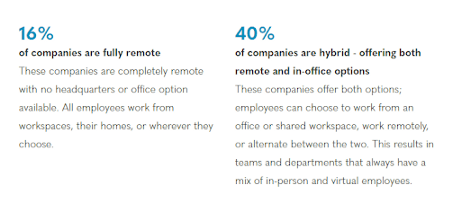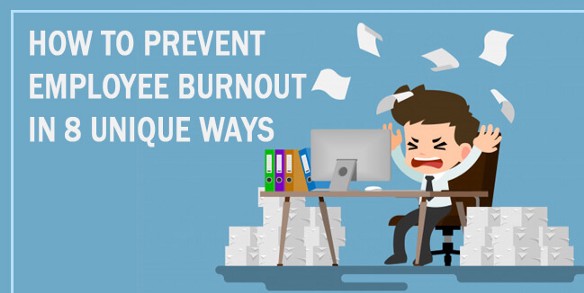An employee burnout crisis is threatening companies around the world. According to the Center for Disease and Control, a shocking 40% of employees say that their job is very or extremely stressful. Moreover, 25% of them report that their jobs are their #1 stressor.
Another study by Gallup discovered that 3% of employees reported feeling burned out at work very often or always, while an additional 44% reported feeling burned out sometimes.
Whether you’re a recruiter at your company or a hiring manager, you should be deeply concerned with your employees’ health. Nearly 10 percent of companies blame employee burnout for causing more than 50% of workforce turnover each year. Employees who’re suffering from burnout are 63% more likely to take sick days and 2.6 times as likely to be looking for another job.
If you want to prevent your best employees from leaving and maintain a supportive environment culture, here are 8 things you can do:
Provide a calm working environment
When CareerBuilder tried to discover the top productivity killers at work, the results were expected: gossip, the Internet, and cellphones are the top interrupters.
When employees are interrupted, their quality and quantity of work suffer. The accumulation of work can then lead to added stress and anxiety. For this reason, your company must provide a quiet, distraction-free working environment where employees can do their best work.
Traditional offices won’t be coming back anytime soon. And the open-space offices have proven to be productivity killers. The solution is to create a workspace with a balance of private offices and collaboration spaces. By doing this, you’ll limit distractions, and your team can perform more effectively.
Additional Reading: 8 Killer Strategies for Retaining Your Best-Performing Employees
Be clear about roles and responsibilities
Never underestimate the seriousness of clearly defining roles and responsibilities to your employees. Failing to do this can lead to a great deal of confusion within the company, and ultimately, employee burnout.
When everyone knows what’s expected of them, they will know what they need to accomplish and how to reach the project’s goals. Instead of wasting energy dealing with who had the responsibility to send that email, the team can focus on more important tasks at hand.
Be clear about job roles and responsibilities from the start. Write detailed job descriptions and be honest about your expectations. Discuss with your employees and outline their responsibilities as clearly as possible. When delegating work that’s out of a person’s responsibility, give that employee the freedom to say no.
Offer flexibility to your employees
In recent years, the number of companies that are offering flexibility to its employees has been on the rise. If we look at one report by OwlLabs, we’ll see that 56% of companies allow remote work – whether they’re “hybrid companies” or are a fully remote company.
Countless benefits exist when you offer employees some type of work flexibility. Flexibility at work comes in different types, including working from home, part-time work, or flexible work schedule. The top benefits include:
- Increased employee morale
- Reduced tardiness and absenteeism
- Lowered stress
- Reduced employee turnover
- Enhanced company reputation

Respect your team’s life outside work
Many managers today believe that if an employee doesn’t spend the night at the office, they’re not committed. However, what they fail to understand is that employees have a life outside of work. To have a thriving and engaged employee at work, you need to have a thriving and engaged employee outside of work.
Instead of penalizing employees for taking some time off, you should encourage them to take the time they need to have a fulfilling life outside of the work building. Whether they need time off to process a difficult life change or attend their child’s theater show, treat your employees kindly.
One study from the University of Michigan found that employees thrive when they’re part of a positive and virtuous working environment. When you treat them with respect and compassion, you can reinforce their competence and inspire them to work towards greater success.
Additional Reading: Employee Attrition vs. Employee Turnover: What’s the Main Difference?
Determine Your Staffing Needs
Companies may survive for a short time with a limited number of employees, but in the long run, understaffing can be devastating.
If your company suffers from not having enough skilled employees to fill important roles and take on crucial tasks, then your employees are at risk of burnout.
Not only that your employees’ mental health will be affected, but your business will suffer from loss of productivity and high turnover.
So, if your team is understaffed, make sure you hire more people as soon as possible. It’s a crucial part of managing a profitable business and ensuring your team stays productive and stress-free.

Create a Fun Environment
Socialization is a significant ingredient of good mental health. Socialization can bring the team together, encourage sharing of information, and boost teamwork. Social psychologists have found that feeling a sense of belonging is an important intrinsic motivator.
Strong social connections make people happier and physically healthier, which can translate into work performance.
Make sure you allow your employees to get together on breaks, at lunch, or after work. Another great idea is to create a fun environment that will inspire good times and laugh. Foosball tables, dart boards, and ping pong tables will do the trick.
Additional Reading: How to Deal With a Toxic Work Environment: Signs and Solutions
Reward Your Employees
Thoughtful gestures can take your company a long way. Employees who feel appreciated and rewarded will work harder and feel more motivated to do their job. This creates a win-win situation for everyone!
If large raises and company dinners every month are out of your budget, there are many other ways how you can thank your employees for their hard work. Consider rewarding them with bonuses, awards, promotions, more vacation time, or public praise.
Provide Ample Feedback
Your employees must know when they’re doing something right and when they’re not performing well. You should put time aside to meet with each employee in person and offer your most honest feedback.
Feedback can promote professional growth and inspire motivation in your workforce. It can also lead to a greater sense of job satisfaction and ultimately, higher employee retention.
Final Word
Employee burnout is a problem that’s easier to prevent than to fix. An employee who suffers from burnout might take weeks or even months to recover and regain their full productivity. Businesses cannot risk losing valuable employees and putting a halt to ongoing projects. For this reason, making sure your people are feeling 100% healthy and happy is crucial. Check-in with them often and strive to create a healthy working environment in which every employee feels happy and has the tools they need to succeed.









